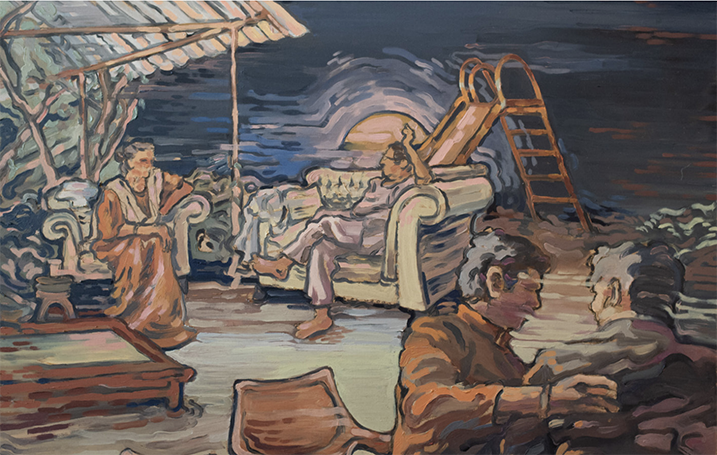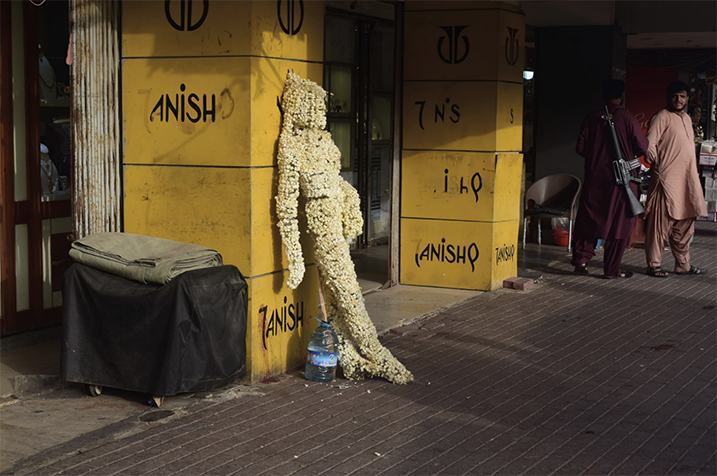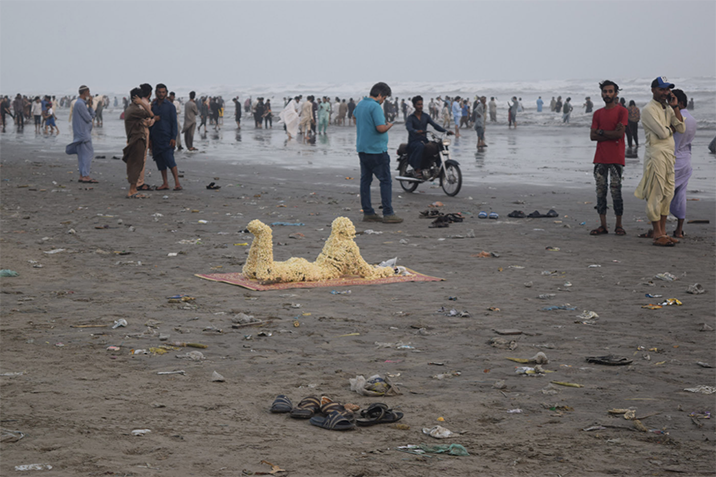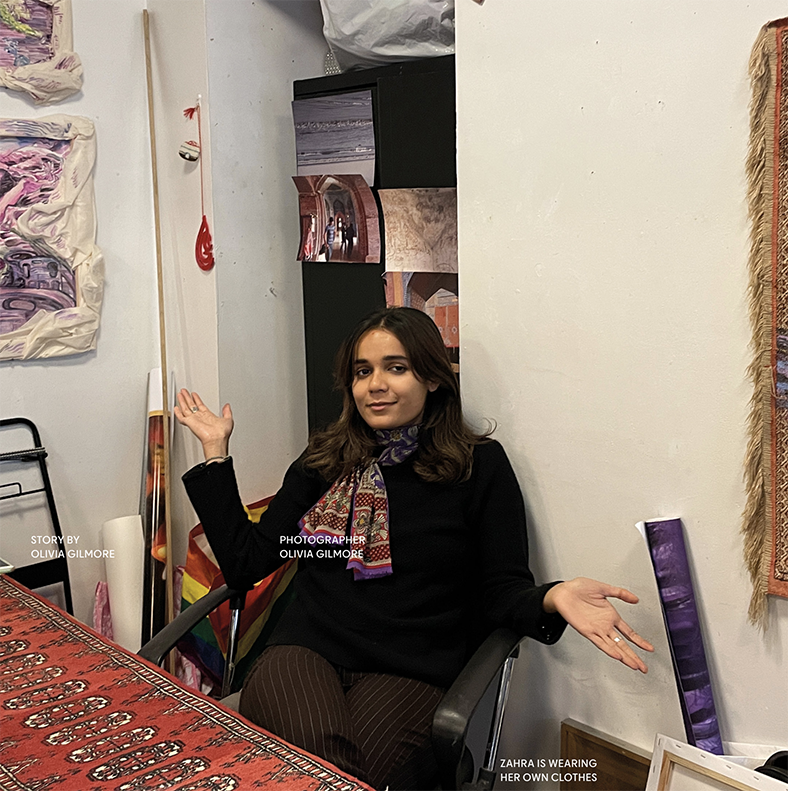
Karachi to Paris: Reconciling Femininity & Identity
Article from issue 1 of ‘later’ – the Parsons Paris alumni magazine.
By Zahra Mansoor


As if gessoing carpets were as quotidian as sweeping the floor, Zahra Mansoor is painting on a small Pakistani rug when I arrive at her studio at 59 Rivoli – a former squat turned into a recognized gallery and artist residency space—on a Sunday afternoon in October. For Zahra, however, this has become a habit; she utilizes such found objects and transforms them into what feel like commemorative shrines. Collectively her art works have an aura of nostalgia, however, it is a balancing act: each has a bone of contention to pick or a layer of the onion to peel regarding the history of colonization, feminism, and globalization.
Zahra was born and raised in Karachi, Pakistan and has lived in Paris since 2019 (with a year in New York from 2021-2022). She is a mixed-media artist, moving fluidly between painting, sculpture, performance, and installation. What follows is our conversation on Zahra’s artistic practice.
So, what are you working on now?
I’m preparing a new carpet; I have a bunch that I have left and I had this vision of doing a show where I just cover the whole gallery in different carpets so I wanted to get this one done and start working on it.
The process is to gesso and then you lay the piece on top?
Yeah, it just depends on what I’m doing for some of them, like this one there, like this one there. I gessoed then I collaged fabric on top. But some of them I’ve been painting directly like the ones at Gallery D. Even the ones in the left corner, those two are just gessoed and directly painted.
The We sin-phool women, this project. So how did it start?
It was actually when I was on exchange in New York. It’s funny, I was in Paris a year before that during the pandemic. Do you know this English-language used bookstore on the left bank, called San Francisco Book Company?
Yes.
I was there, and I picked up this poetry book called Sultana’s Dream, completely by accident. Saw the cover and it looked interesting because it was a Bengali author, and she was writing in English. And I was like ok maybe I’ll read this on my flight or something. It was really inspiring because it was a story of a world without men. Written by this Bengali princess in the 1800s or something like that and I was surprised by how progressive her thought process was. Also, the fact that she was writing in English and all of that. So, it inspired this project because originally what I wanted to do was project videos of women in public spaces in Karachi, dressed how they would want to be dressed. Because you know, you have to be really careful in a city like that. That was my initial idea. That’s what I used in New York to apply for funding with a friend of mine, Tessa Makai.
I understand.
So, we got the funding, and I was really happy. And then, it slowly shifted into these sculptures because we realized that it was very practical to project the videos in the summer. But then I started looking at the jasmine flower as symbol for women.
Jasmin is the same as the motia?
Exactly yes, the Arabian Jasmine.
It smells so good.
So good. I rarely see them here by the way.
I see them on a lot of walls in Paris. So, it’s symbolic of what were you saying?
It’s symbolic of the sacred feminine and it’s also the national flower of Pakistan. Which I was surprised by because it’s really this goddess flower and it’s funny that it’s our national flower when they don’t really treat women like this. Like they’re sacred anymore. So, the idea kind of changed into doing life sized sculptures of women instead. And then putting them in public space and seeing how people would react to them. And then, leading up from the book that I read when I was in Paris, I started looking at a bunch of poetry. And then that’s how we came across this poem called “We Sinful Women”. So it’s by this Pakistani feminist poet, so we got the translation from this book and then the title is a play on words because the word “phool” in Urdu means flowers, so it’s like “sin-phool” women. And we had a fundraiser in New York, and we did prototypes in the city. And then we travelled to Karachi for over two months. One of the best things I think I’ve done.
They are so interesting looking, and they are supposed to be naked?
A mix of both. It’s either, it’s almost like husks of women when I see them like snake skin almost.
But they don’t have clothes on.
No, they are naked. Absolutely.
And had you worked in sculpture before these?
No never, Olivia, I am horrible at sculpture.
No, they are great. I am so impressed by the weaving of the flowers. How many did you make in the end?
We made five. It was intense work. At the end we got friends to help out putting the flowers on because it was taking forever. Then we let them name them all.
Did you ever have interesting reactions to the sculptures?
For sure. Sometimes they were mad at us for putting them in, like the one in the mall. They were like “this is illegal; you aren’t supposed to do this,” my brother had to argue with them. The one at the beach, they thought it was a cursed object. Because there’s a lot of superstitions about touching things on the beach that are organic. So, a lot of women were telling their kids to not go and touch them and warning them kind of.
So, let’s talk about your other pieces in the studio. What about this painting?
Did you ever read Slaughterhouse Five? I like the book because the aliens see time as humans can’t see it, they see it as a landscape. There’s one quote – I can’t remember exactly – but something about how when you think of moments in your life it’s not actually gone forever but all of them exist in this landscape of time.
Would you ever move back to Karachi?
It’s a little bit complicated because my mother wants me to get married. That’s why my work is about reconciling where I come from and trying to still be able to love those things but not be spiteful about things that I can’t have. It’s very complicated.
I see because part of you wants that? Part of you wants that tradition and the comfort of that but that’s not who you are either.
No. It would be very easy for me to live there, to go and come back. But honestly, it’s horrible. Yeah because, the only reason why I make work is because I was so fucking bored growing up. The political situation was bad and it’s getting worse again and when I was growing up we’d have like bombs every week. I wouldn’t go to school like three days a week. I had no mobility, and I still don’t. So, my family is an old family in the city. Like European cities it’s the same way you know, like in the old center– but nobody lives there anymore. You wouldn’t want to live in Chatelet for example. The difference is, I can’t go outside, there’s no public transport.
No transport?
There’s buses and small rickshaws and stuff. But the class gap is huge. There’s no middle class and that’s how life is. I either go out with my mom or my dad or I don’t go out. So, a lot of time to do nothing. That’s how you start doing creative stuff.
Yeah.
Also, it’s very dangerous for women. I think it’s getting worse. There’s a lot of forced marriage, a lot of arranged marriage. It’s just if I were to go back, the thing is, Olivia, I would need to get married. Because I can’t live in my family’s house forever. Even if my brother takes me out. It’s not safe. The way the whole society is set-up, for example, on my driving license it says either my father or my husband’s name on it. As a woman you are always somebody’s property. If you’re not married and you’re like 30 or 40 –
You’re like a witch…
Yeah! Either you’re having sex outside marriage which just makes you a slut or you’re a virgin which makes you … like sexually attractive. So, there’s no winning. But listen, for me, there’s still things that I like about my culture.
Of course!
And so, a lot of my work and my life is about trying to not be mad about things that are bad and taking ownership over the things that I want to take ownership over. And also, it’s entrenched in me. I can’t help the fact that I’m from here. I can’t ever change this so I might as well try to love myself in some way. Because a lot of the beauty is also not accessible to me… because I can’t even attend a traditional music concert — like a Qawwali – usually because like for men it can be a little bit more loose and dance and stuff. It’s very male-dominated. When my friend Tessa was there, there was a Qawwali night, but it’s all men singing. I love the music, so we went. But it’s so awkward. There aren’t really so many women, and we try to be like so conservative, so men don’t look at you. Like I can’t like sing or dance, or I’ll be seen as lose. Even to see architectural monuments or the mosques – you never go without a man with you. So I work with imported landscapes, looking at the difference between here and there the East and West and how it’s all connected. And the borders and thinking of South Asia as region and seeing these different motifs. Working with female friendships, female intimacy.

